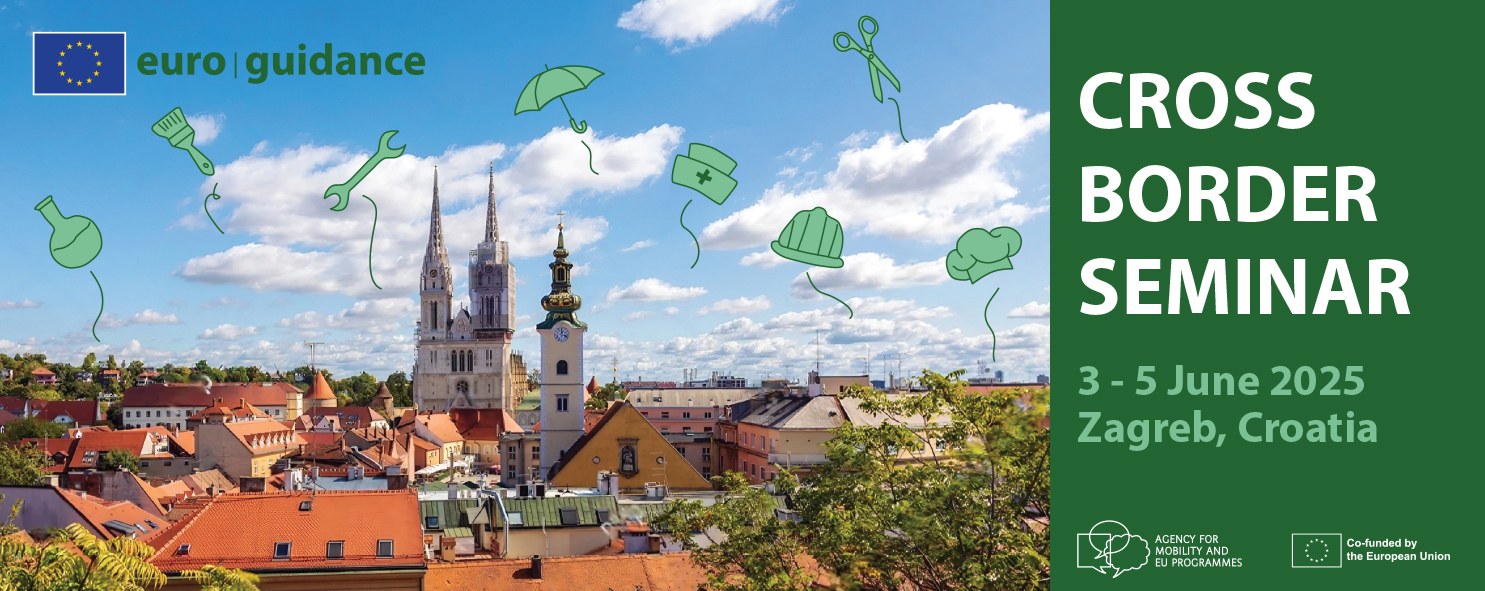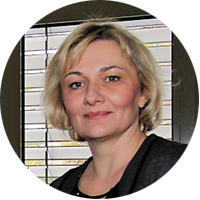
Plenary Sessions
Breaking the Myth: The Importance of Career Guidance in Vocational Education Schools
Maja Parmač Kovačić, PhD (Department of psychology, Faculty of humanities and social sciences, University of Zagreb, Croatia)
About the plenary session
The myth that career guidance is unnecessary in vocational educational schools has persisted for far too long. This presentation aims to dispel that notion, highlighting the vital role that career guidance plays in shaping the futures of students in these institutions.
Contrary to popular belief, vocational education serves as a crucial stepping stone for many students, with statistics showing that a significant percentage continue their education after graduation. Many students enter vocational schools at a young age, when they may lack the maturity necessary to make fully informed decisions about their future careers. Also, individuals evolve, and their interests can change over time. As a result, traditional career guidance, which includes helping students choose the right path for further education and future professions, is important in these settings.
In addition to this traditional support, vocational education students also require a different aspect of career guidance that prepares them for the world of work, particularly those who may not pursue further schooling. This includes, for example, opportunities for employer visits, networking experiences, and instruction in job search skills and entrepreneurial skills. By engaging students with real-world organizations and fostering connections within their chosen fields, we can enhance their readiness for the workforce and empower them with the skills needed to navigate their future careers successfully.
This presentation will emphasize the critical role of comprehensive career guidance in vocational education. By addressing the importance of informed decision-making regarding further education and preparing students for the professional world, we can effectively dispel the myth that such guidance is unnecessary.
About the expert

Maja Parmač Kovačić is an associate professor at the Department of Psychology, Faculty of Humanities and Social Sciences at the University of Zagreb. She teaches several courses in the area of work and organizational psychology at the undergraduate, graduate, and doctoral levels. She designed and teaches the course entitled Theory and Practice of Career Guidance, which is conducted at the graduate level of psychology.
One of her primary professional interests revolves around career counselling and career development. She has conducted numerous lectures and workshops in this field. To date, she has co-authored a book and published a substantial body of research papers, some of which have been featured in globally recognized journals (e.g., International Journal of Selection and Assessment, Journal of Personality Assessment, Journal of Personnel Psychology, Current Psychology). Moreover, she has designed and adapted various measurement tools and actively participated in numerous international scientific and professional conferences.
Vocational School Selection in Croatia: Challenges and Support
Toni Babarović, PhD & Iva Šverko, PhD (Ivo Pilar Institute of Social Sciences, Zagreb, Croatia)
About the plenary session
This presentation connects research findings with practical applications in the context of vocational school selection in Croatia. It draws upon research investigating the factors that influence adolescents’ career choices, including the significance of vocational interests, the developmental aspects of career maturity, and the pervasive impact of gender stereotypes. Research indicates that low congruence between interests and chosen programs, inadequate career maturity, and gender-biased perceptions of abilities can lead to suboptimal educational and career outcomes. In response, the presentation showcases evidence-based practices and interventions designed to support students in navigating these challenges. This includes the implementation of career development programs in schools, the use of online career counselling resources, and strategies for mitigating the effects of gender stereotypes through educational initiatives and awareness campaigns. By integrating research insights with practical tools and strategies, the presentation seeks to inform and enhance career guidance and support systems, ultimately facilitating more effective vocational school selection and promoting positive career development of youth.
About the experts

Toni Babarović is a Senior Scientific Advisor at the Ivo Pilar Institute of Social Sciences and a Full Professor at the University of Zagreb, Croatia. His research spans vocational and work psychology, educational psychology, and quality of life. He has published over 40 peer-reviewed articles and 13 book chapters, and more than 120 conference papers, contributing extensively to these fields. He teaches courses on statistics and psychometrics at University of Zagreb and work and organizational psychology at University of Split.
Iva Šverko is a senior scientific advisor at the Ivo Pilar Institute of Social Sciences in Zagreb and full professor at the University of Zagreb, Croatia. She was principal investigator and team member in several research projects concerning career choice and development in adolescence and has published her findings in more than 50 articles and book chapters. She teaches courses on career psychology at University of Zagreb and work and organizational psychology at University of Split.
Panel discussion
One Career Path to Countless Destinations: Rethinking Career Guidance in VET
About the workshop
Modern careers are characterized by high flexibility and mobility, lifelong learning, non-standard work contracts, the rapid emergence of new professions, and the disappearance of traditional career paths. In this context, career counseling and guidance have become lifelong necessities for the working population. Despite this reality, a persistent myth remains—that career guidance ends with the choice of a secondary vocational school. The panel will challenge this misconception. The panelists, all experts who work daily with vocational school students, will share their extensive experience in career counseling.
Panel leader:
Darja Maslić Seršić, Faculty of Humanities and Social Sciences, University of Zagreb, Croatia
Participants:
Cynthia Harrison Villalba, European Centre for the Development of Vocational Training
Birgit Tschense, International Services (Federal Employment Agency), Germany
Lisa Fasching, Federation of Austrian Industries, Styria, Austria
Imre Zsanett, Székesfehérvár Center of Vocational Training, Hungary
Luka Kamenov, Ruđer Bošković Technical School, Zagreb, Croatia
Panel leader - Darja Maslić Seršić

Darja Maslić Seršić, Faculty of Humanities and Social Sciences, University of Zagreb, Croatia
Darja Maslić Seršić is a Professor of Psychology at the Department of Psychology, Faculty of Humanities and Social Sciences University of Zagreb. She teaches courses in Research Methods, Organizational Psychology, Occupational Health Psychology, and Vocational Behavior. Her research interests lie in the field of Work and Organizational Psychology, with a focus on work-related well-being, work motivation, and adaptive career behavior. In collaboration with the Croatian Agency for Mobility and EU Programmes, she has been leading lifelong learning courses in career counseling for education professionals for over a decade.
Participant - Cynthia Harrison Villalba

Cynthia Harrison Villalba, European Centre for the Development of Vocational Training
Cynthia Harrison is a policy officer at the Department of VET and Skills, area of learning and employability. She is responsible for Cedefop’s strand of work on policy and systems development in lifelong guidance and coordinates CareersNet. Her work has involved collaboration on common policy frameworks and guidelines in education and training, most recently, in the field of lifelong guidance. Her VET supporting policies team colleagues specialise in validation of informal and non-formal learning, financing, and statistics in adult learning/VET and who all engage in cooperation with networks, policy stakeholders and experts towards developing tools, resources and building evidence to strengthen policies and systems development. Her academic background includes postgraduate studies in international and comparative education policy and sociology, also engaging in mixed-method research on civic competences and career aspirations, including collaboration on a composite indicator. She has also worked in the adult learning and youth sectors.
Participant - Birgit Tschense

Birgit Tschense, International Services (Federal Employment Agency), Germany
Birgit Tschense’s path into career guidance began with her academic background in German studies, journalism, media, and political science in Bamberg and Düsseldorf. Early professional experience in journalism and market research provided her with valuable insights into communication and societal trends. Since 2002, she has worked as a studies and career counsellor at the Federal Employment Agency in Düsseldorf, where she supports individuals in navigating their educational and professional paths. Over the years, she has expanded her expertise through various roles: as a Training Expert (2013), Eurodesk Mobility Advisor (2014), University Lecturer (2017), and EURES Advisor (2022). In 2023, she joined the Euroguidance network at ZAV Bonn, where she continues to contribute to international guidance and mobility strategies.
Participant - Lisa Fasching

Lisa Fasching, Federation of Austrian Industries, Styria, Austria
Lisa Fasching’s professional journey in education policy began during her academic studies in (international) law. This interest grew as she worked as a seminar trainer and ambassador for career orientation, supporting young people in their career decisions in collaboration with industrial companies. She now focuses on education, labour policy, and international relations, working at the intersection of law, economics, and education. She manages projects, contributes to policy development, and collaborates with regional and national stakeholders. As a member of various advisory committees, she actively shapes education and career orientation strategies, fostering innovative, interdisciplinary approaches that connect education with the requirements of the economy.
Participant - Zsanett Imre

Zsanett Imre, Székesfehérvár Center of Vocational Training, Hungary
Zsanett Imre is a dedicated education professional with a background in teaching and school administration. She began her career as an ESL teacher, focusing on communication and student engagement. Since 2020, Zsanett has been teaching in a Vocational Education and Training (VET) school, where she has gained valuable experience in supporting students as they prepare for careers in various industries. In 2024, she was appointed Deputy Principal, a role in which she leads academic initiatives and supports institutional development. Her responsibilities also include event organization and career orientation, where she helps students explore and pursue their career pathways. With her combined experience in teaching, leadership, and career guidance, Zsanett continues to make a significant impact on the educational and professional success of her students.
Participant - Luka Kamenov

Luka Kamenov, Ruđer Bošković Technical School, Zagreb, Croatia
After graduating in Psychology from the Faculty of Humanities and Social Sciences, University of Zagreb, in 2020, Luka Kamenov began his professional career as a school psychologist at OŠ Ivana Granđe, Soblinec Elementary School, and later worked as an expert advisor at the Croatian Employment Service. He has a strong background in counselling, career development, and assessment, and is skilled in providing effective support to individuals seeking employment and career advancement. He is currently employed at Tehnička škola Ruđera Boškovića, a vocational school in Zagreb, where he works as a school psychologist. His work combines expertise in both developmental (school) and organizational (work) psychology, with a focus on education, guidance, and counselling for students.